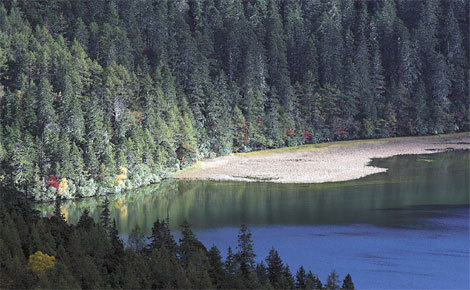Mainstream tourists have only just discovered the natural beauty of Shudu Lake in Shangri-La County, Diqing Tibet autonomous Prefecture. The turquoise-blue waters and the pristine, evergreen forests are a sight to behold and for the past decade, local authorities have tried various ways to attract more visitors.
 |
|
Turquoise-blue waters and pristine, evergreen forests make Potatso National Park, in Yunnan Province, a magnet for tourists from home and abroad.
|
The biggest campaign occurred in 2001, when Zhongdian was renamed Shangri-La, after the fictional land in James Hilton's novel Lost Horizon, in an effort to promote tourism in the area in northwestern Yunnan Province.
But as the tourism campaign for the region began to take shape, disaster struck Shudu Lake in the most ironic way.
A private developer had started breeding several different kinds of exotic carp in the lake to attract more visitors, especially anglers. But the experiment backfired and wiped out the local fish in the lake. Today these native fish can only be found in the neighboring Bita Lake, another popular tourist destination.
The local government realized the damage that had been done and took action. The private developer's managerial authority was canceled and the two lakes have been upgraded into Potatso National Park, together with adjoining pastureland, mountains and forests.
In June last year, the 1,000-sq-km park, 22 km west of the town of Shangri-La, became China's first national park. "It's truly the first successful step of our efforts to introduce the concept of a national park into China," says Chen Jie, Yunnan program director of The Nature Conservancy (TNC), an international non-governmental conservation organization based in the United States. "It means Yunnan has started blending tourism development with nature protection."
The local government invited TNC to help plan a "biodiversity special zone" at another site in Diqing in 2004. The two sides held several meetings on ecotourism and reserve managers toured national parks in the United States and New Zealand for ideas.
In 2006, the research office of Yunnan provincial government and the China Program of TNC published a book on national parks and started promoting the concept in the province. In the same year, the Diqing government decided to build up Potatso National Park and invited Southwest Forestry University to make a master plan.
At that time, Chen says, Shudu Lake was not a protected area and although Bita Lake is a provincial reserve, "it was short of funds and lacks the resources needed to better protect the area".
"There were only 18 employees in our reserve," says Ding Wenhai, head of the reserve's administrative office. "We have to face 200,000 tourists a year and make regular patrols and we were unable to put local horse keepers from nearby Tibetan villages under effective management, monitor our ecosystem and make some scientific research."
As a result, he says, hundreds of horses came to the reserve daily to cater for tourists but the effect was damaging. "They trod all over our wetlands and their droppings contaminated the water," Chen says.
"Local government and communities haven't benefited much from tourism. Our major income is from entrance tickets, which was priced originally at only 5 yuan per person and later increased to 30 yuan."